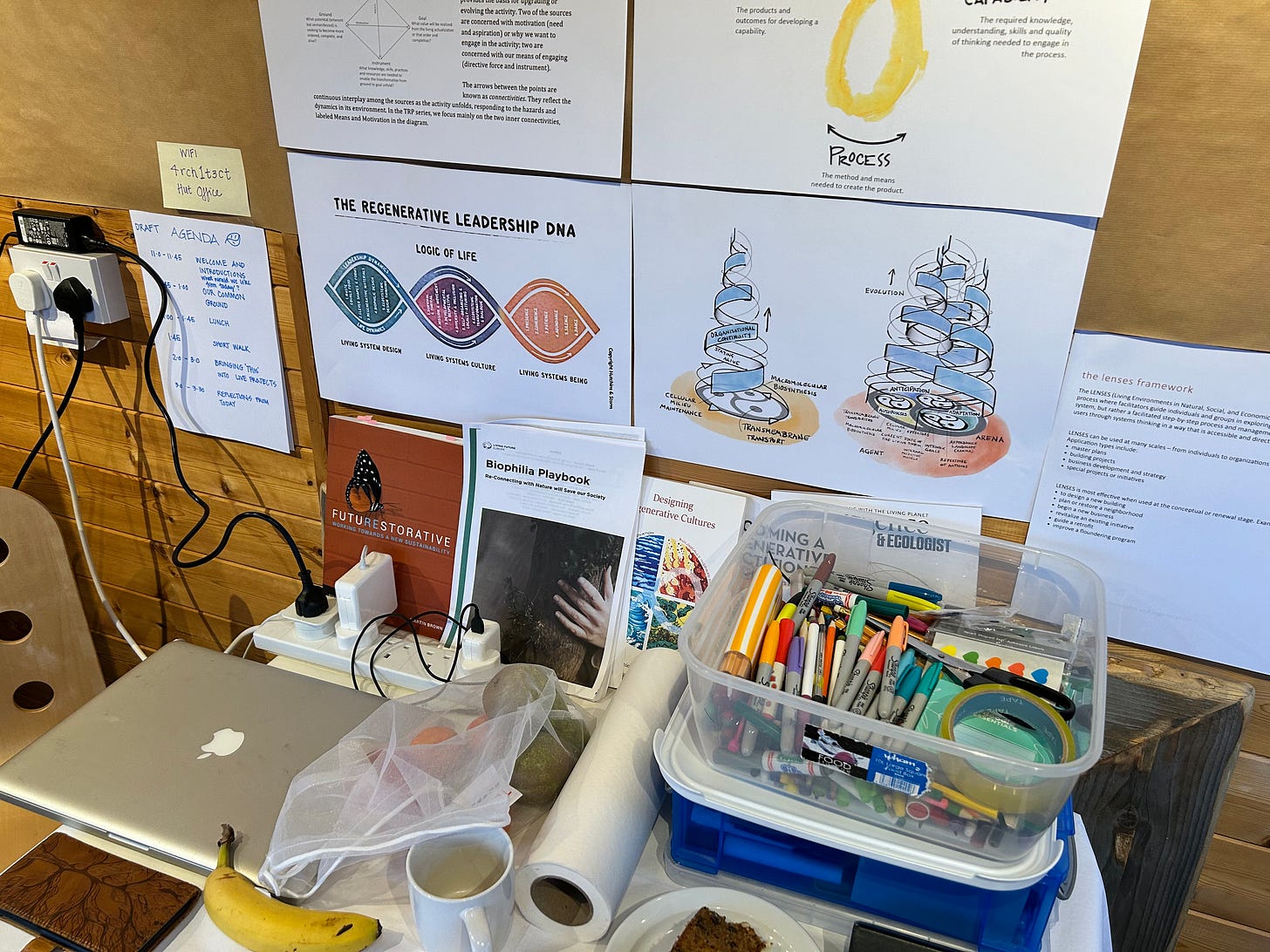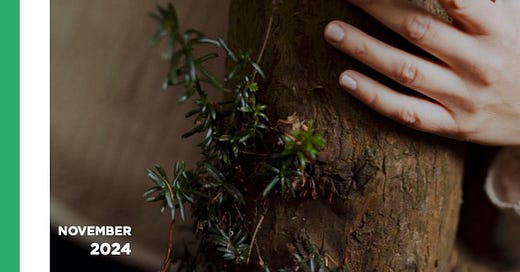Reconnecting with Nature will Save our Society. A Living Future Europe publication
“We know in our hearts and souls that a healthy connection with nature isn’t a luxury - it is the foundation for our personal wellbeing, the catalyst for our achievements, the strength of our organisations and the key to a thriving ecological future” Martin Brown
Our relationship with nature changed during the pandemic lockdown. Through our one-hour allowed outdoors, we fell in love with nature again, and biophilia our love of nature was rekindled.
As we returned to work, we took plants into the office, we saw expressions such as 'Homemaking at Work', induction and onboarding now includes advice on local quiet green spaces for lunch or contemplation. We are taking work and meetings out of the office.
This playbook captures our new relationship and love with nature, a kinship that will manifest in better biophilic designs. It explores a relationship with core regenerative design as all biophilic designs must enable ecological and social systems to thrive. We look beyond patterns and attributes, behind the shop window of current trends in biophilic design, to something more meaningful.
Playbook defintions will challenge, in a good way, our understanding of biophilia, biophilic design and nature connectivity.
Nature ... in a wider sense, the whole of the natural world, including humans and the cosmos ... Oxford English Dictionary 1873.
Biophilia undoubtedly manifests itself differently for each of us as individuals, but it is that biophilic-self that informs our projects and enables biophilic or nature-positive organisations. Through the three sections of seeding, growing, and pollinating, the playbook prompts questions for reflection as individuals projects and organisations.
How do you listen to the voice of nature on your project? Playbook Prompt
As we move from the Anthropocene into the Symbiocene, we are only starting to regain the knowledge of how interdependent we are with nature, and it is from this rediscovery, this exciting exploration that buildings in harmony with nature will emerge.
This playbook is therefore for those who are looking for a deeper connection and sensing of the place we, our projects and our organisations have within nature and ecological systems and how that can better manifest in the work that we all do,for a future thriving society.
Tools like this Biophilia Playbook can create the kinds of places that elicit deep engagement with nature and future generations. Bill Browning (Foreword)

Author comments on the growth and nuturing process of bringing the playbook into the world:
Nicole Craanen: What an inspiring process! It was significant to collaborate closely with this group to co-create the biophilic playbook. Together, we shared our ideas, supported one another in exploring and engaged with new and diverse perspectives. I hope the playbook continues to spark conversations that deepen our collective understanding.
Maria del Pilar Porras Villarreal: For me, the Biophilia Locus has been a lifeline and safe space in navigating the complexities of our time. As a supportive community, united by diverse backgrounds, we have fostered co-creation and connections across latitudes, translating the language of nature into joy, understanding and hope.
Amit Anafi: Such an insightful journey. I was constantly inspired and grateful for all the people who contributed to this small biophilic gem. Hopefully, these small seeds we planted together in our and others’ hearts and minds will become a forest, a movement, a way of life towards a better future.
Joe Clancy: The diversity of perspectives was enlightening and it was a delight to hear how broad the application, personal meaning and understanding of biophilia reached for each individual of the Locus. It further demonstrates the importance of understanding the user and the need to design with communities, and not for.
Paola Di Legge: The experience of co-creating this playbook was incredible. The active collaboration and sharing of valuable insights on biophilia made this experience really special. Personally, it allowed me to deepen my understanding and increase my passion for biophilia even more. The process of sharing ideas and knowledge was as important as the final product.
Alice Piovan: Working on the playbook was an incredibly enriching experience. I gained invaluable insights by collaborating with other professionals and passionates about biophilic design. The process of co-creating and sharing ideas was far more impactful than writing the text. It was truly inspiring and a testament to the power of collective creativity.
Martin Brown: The writing, editing and production of this playbook has been a real joy, I am humbled by the co-creation endeavours, generosity and spirit of the Biophilic Society locus, now a group of friends, sharing not only expertise but a profound passion for nature.
Florencia de los Santos: It is a great honour to be part of this powerful resource that goes beyond patterns and aesthetics, offering a rich exploration of how biophilic design fosters meaningful connections and drives regenerative impacts in the spaces we inhabit. I feel incredibly fortunate to collaborate with remarkable colleagues and friends from diverse countries and disciplines, united by a shared vision: weaving nature into the fabric of our personal and professional lives and communities. Together, we are reimagining how spaces can become places of connection, well-being, and harmony—celebrating our innate bond with the natural world.
Kaitlyn Gillis: Being part of the Biophilia Locus is a gift that I will always cherish and it has been wonderful working with this group to create the Biophilia Playbook. The Playbook will enrich our collective knowledge and will help elevate biophilia in all areas of our lives.
Biophilic Design
An approach to design that fosters reciprocity between humans and nature, creating mutually beneficial relationships through built environments.
A verb and process, not a noun or product.
Regenerative Biophilic Design
Creating conditions that allows ecological and social systems to thrive.



